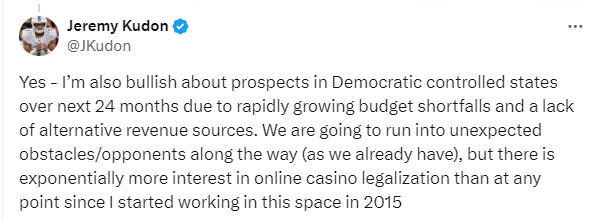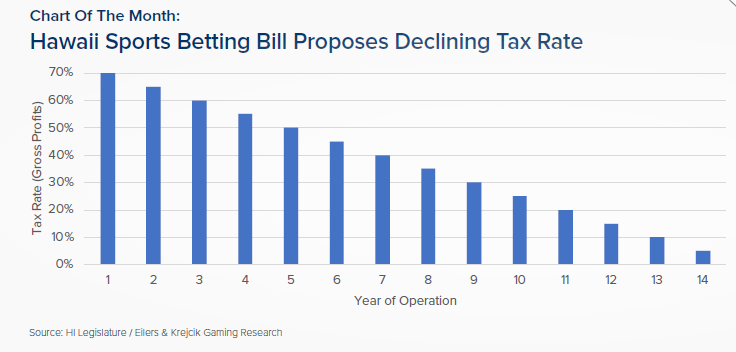Extending An Olive Branch
Following a contentious fight over sports betting in 2022, FanDuel is trying to make amends with California tribes.
The Bulletin Board
NEWS: FanDuel’s apology tour tries to mend fences with California tribes.
BEYOND the HEADLINE: FanDuel hires former NIGC Chairman.
NEWS: Online casino discussions are happening in Illinois and Ohio, but action is still unlikely.
LEGISLATIVE ROUNDUP: Sports betting roadblocks in MN, OK, and GA; DFS operators support bills in IL and GA.
VIEWS: Is Kambi on MGM’s radar?
AROUND the WATERCOOLER: MA’s interest in DFS 2.0 raises eyebrows.
STRAY THOUGHTS: The obsession with reinventing the wheel.
SPONSOR’S MESSAGE - SUBSCRIBE NOW to Zero Latency, the new podcast from Eilers & Krejcik Gaming that provides unparalleled insight into the U.S. online gambling industry through interviews with industry insiders and analysis from EKG experts.
FanDuel Takes the L at Western Indian Gaming Conference
After butting heads over sports betting in 2022, FanDuel has taken steps to repair its strained relationship with California tribes. The latest olive branch FanDuel extended to California tribes was the Western Indian Gaming Conference, which FanDuel sponsored.
As reported by Play USA’s Matthew Kredell, FanDuel President Christian Genetski made no bones about it; FanDuel messed up.
“I think if I’m being a little charitable, it was what I would describe as a well-intentioned but uninformed and misguided attempt,” Genetski said of the failed ballot initiative of 2022 during a panel discussion. “It was definitely a spectacular failure from our perspective, but that’s OK. It wasn’t the time, and it wasn’t the right way, and we understand that.”
For those hoping the apology tour will bring sports betting to California, think again. Genetski said there is little chance before 2026 and pushed the timeframe out to 2030 or beyond:
“Will that happen by 2026? Well, it’s the first time it can happen. I can go on record that it’s not happening before that. But whether it’s 2026, 2028, or 2030, we’ll know when we know.”
The good news is that mending fences with tribes will pay dividends beyond the borders of California, as the tribal gaming states of Oklahoma, Wisconsin, and Minnesota all lack mobile betting.
How is the marriage counseling between FanDuel and the commercial industry and tribes going? As I recently wrote when commercial sportsbooks joined forces with tribes in opposing a 2024 ballot initiative:
“The enemy of my enemy situation may help mend some of the fences torn down during the 2022 initiative battles that turned ugly very early on. In a recent episode of the World Series of Politics podcast, Pechanga.net publisher Victor Rocha also noted the hiring of Rikki Tanenbaum by FanDuel, who, as Rocha put it, could help teach the commercial operators how to “talk to tribes.”
Beyond the Headline: FanDuel Makes Another Tribal Hire
Last week, we learned E. Sequoyah Simermeyer was stepping down as the chair of the National Indian Gaming Commission. We now know why.
Per reporting by Sports Handle, Simermeyer has landed at FanDuel as the company’s Vice President of Strategic Partnerships. He joins two other recent hires, Rikki Tanenbaum as SVP of Strategic Partnerships and Frank Sizemore as VP of Strategic Partnerships, who both worked for the San Manuel Tribe in California.
Simermeyer’s abrupt resignation as NIGC Chair and soft landing at FanDuel is the latest indication that, at least when it comes to FanDuel, they are learning to, as Victor Rocha puts it, “speak tribe.” Also known as listening.
“He’s a big deal; I think it shows a seriousness,” Rocha told Sports Handle. “Sequoyah is really admired because he listens. He’s done a great job of taking more of a hands-off approach.”
Or, as industry consultant and analyst Gene Johnson put it on X, “FanDuel is finally getting a clue - learning about tribal government gaming.”
The question is, are FanDuel’s competitors taking notes?
The Latest on Online Casino Legalization in IL and OH
Illinois and Ohio are flirting with online casino legislation, but it’s unclear if online casinos are flirting back.
Illinois Rep. Edgar Gonzalez recently told Play USA that any action on HB 2239 was to keep the conversation alive while he attempts to educate his colleagues:
“At this point, me asking for it to be moved out of rules and assigned to the Gaming Committee is just for the conversation not to die. I’m not sure it will get out of committee or even get a hearing… I think we definitely need to lay a bit more groundwork before we have one of the public-facing subject matter hearings.”
For the optimists out there, I’ll remind you that DraftKings CEO Jason Robins mentioned Illinois as a 2024 dark horse during the company’s earnings call, saying, “There are a few states that I think are getting momentum on iGaming, and it will be hard, but I think we’re going to get at least one or two this year.”
And there is also Jeremy Kudon’s tweet about Democratic-controlled states and budget shortfalls - Illinois is staring down a nearly $900 million shortfall:
In Ohio, online casinos were discussed during the first meeting of the Study Commission on the Future of Gaming in Ohio. However, it was more of a conversation starter.
Jeff Facemyer, a legislative assistant to Rep. Jay Edwards, the co-chair of the committee, told PlayUSA the meeting was little more than a first look at the topic for members:
“The members were pretty uninformed about what iGaming, so the SBA was informative on what it encompases as well as the kind of revenue iGaming is bringing to states similar to Ohio. I think those were questions from the committee along with what increases are seen in problem gambling when iGaming is implemented.”
Legislative Update: MN and OK Sports Betting Struggles; Friendly Legislation for DFS 2.0
Minnesota: A Minnesota sports betting bill passed after a contentious hearing where problem gambling took center stage. The House Human Services Finance Committee advanced Rep. Zach Stephenson’s bill on a split vote. The bill now heads to the State and Local Government Committee. There is a competing bill in the Senate.
Oklahoma: The latest effort to legalize sports betting in Oklahoma is a “non-starter” with tribes, according to Matthew Morgan, chairman of the Oklahoma Indian Gaming Association. Morgan spoke with PlayUSA, saying the bill is in lockstep with Gov. Stitt’s proposal, which is seen as an “immediate violation of our compacts because it allows non-tribal operators into gaming.”
Georgia: Partisanship is upending Georgia’s sports betting efforts. “As a constitutional amendment becomes more and more likely and Dem support less and less likely, it seems like it will just end up in the same spot as always,” an industry source told Legal Sports Report. One positive (depending on your POV) is sports betting’s travails could lead to the passage of DFS legislation (see next entry).
DFS Bills in GA and IL: Amidst the many negative outcomes, daily fantasy sports 2.0 operators can point to two new bills that would legalize Pick ‘Em style contests. In Georgia, HB 1329 would legalize and tax DFS operators. In Illinois, HB 5648 and SB 3710 would exclude fantasy sports contests from sports betting.
Sponsor’s Message - BroThrow.com is building the most player-friendly company in sports gaming.
Our subscription-based, no-juice sports betting platform provides the fairest, simplest way to bet on sports with your friends.
Check out our tech: https://brothrow.com/
MGM + Kambi?
MGM has been kicking tires as it looks for a permanent, in-house sports betting solution. The most likely target is BetMGM’s current US partner, Entain, but MGM’s previous offers to acquire Entain have been rebuked.
MGM has been vocal about bringing its online tech in-house.
“We want to obviously be in our own sports betting business with our own technology,” MGM President and CEO Bill Hornbuckle said during the company’s recent earnings call.
With MGM unable to corral Entain, attention is turning to an alternative option, Kambi (a newsletter sponsor).
Per the Eilers & Krejcik Gaming (also a newsletter sponsor) EKG Line newsletter, Kambi makes a lot of sense:
But who fits the bill? Kambi is a logical acquisition target thanks to a relatively low valuation (current market cap around $390mm) and existing ties with LeoVegas and MGM in the UK—so much so that it’s a surprise a deal hasn't been done yet.
Kambi’s recent deal with Bally’s included an option for Bally’s to buy the code and develop it itself. That could serve as a template for an MGM deal, in our view.
Around the Watercooler
Social media conversations, rumors, and gossip.
The office of the Massachusetts Attorney General told gaming regulators it intends to send Cease & Desist letters to DFS operators offering certain types of contests - the Massachusetts Gaming Commission announced it was looking into DFS 2.0 companies in August.
Per Legal Sports Report, Massachusetts Assistant AG Pat Moore said the office is preparing the letters but noted the AG’s office was interested in a civil, not criminal, outcome.
“We are prepared to send a cease and desist letter to the daily fantasy sports operators. We think we have enough within the office to staff any litigation that comes out of that for an interim period.”
The action raised several eyebrows on X, with Jessica Welman wondering why companies registered with the AG’s office and paying the requisite taxes would suddenly come under fire.
Stray Thoughts
It’s a long-term opportunity.
Per the latest Eilers & Krejcik Sports Betting Policy Monitor, “a single entity chosen to offer OSB would pay the state an eye-watering 70% of “gross profits” (not explicitly defined) in year 1, and subsequent years’ rates would decrease by 5% until year 14 when the tax rate would be just 5%.”
EKG highlighted the strangeness of the proposal in chart form:
Without getting into Hawaii’s chances of legalizing sports betting, the proposal is a microcosm of how states treat gambling; for reasons unknown, everyone is always trying to reinvent the wheel. To quote Michael Jordan, “Stop it, get some help.”








